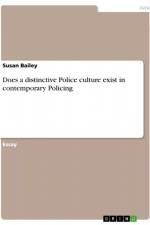von Susan Bailey
9,99 €
Essay aus dem Jahr 2017 im Fachbereich Jura - Strafprozessrecht, Kriminologie, Strafvollzug, Note: 70, University of Hull (University Cente Grimsby), Veranstaltung: Criminological Studies with social sciences, Sprache: Deutsch, Abstract: This essay investigates whether there is a distinctive police culture within UK law enforcementThe term ¿police culture¿ is used to describe a complex set of beliefs and values held within the police force. Culture has also been described as a patterned set of understandings to enable officers to cope, and adjust, to the pressures and tensions of front line policing. There has been an increasing public interest in police culture over the past forty years, this interest is mainly due to public concerns, and therefore a discussion will be attempted, to look at if, and how police culture has changed. Events such as the Scarman Report have identified many of the problems within police culture, as has the Macpherson Report, this essay will seek to evaluate whether these issues have been resolved in contemporary policing. A great number of scholars have studied police culture, such as, Reiner, Skolnick, Westley and Wilson, although most observational studies have focussed on uniformed officers, ignoring the behavioural differences and attitudes between ¿street cops¿ and ¿managerial cops¿. Reiner famously summarised that police officers have core characteristics, he described the police as pessimistic, conservative, mission orientated, isolated, suspicious and masculine. Policing has traditionally been a heterosexual, white male dominated occupation. With officers usually coming from an upper working class background, with very little formal education. This created issues for individuals who did not fit these requirements due to sexuality, ethnicity or gender. Stereotypical ¿cop culture¿ has been described as almost a pure form of hegemonic masculinity. Officers are described to be aggressive, competitive and have a very patriarchal view towards women, often using racist or sexist language. Women encountered significant difficulty gaining acceptance into the police force as ¿real¿ officers. Members of the force become extremely loyal towards each other, and became isolated from others outside of the force. Westley suggested that police officers react this way for self-protection from the hostile world, as they see it. Joining together in isolation, and secrecy, from those outside of the police force.





